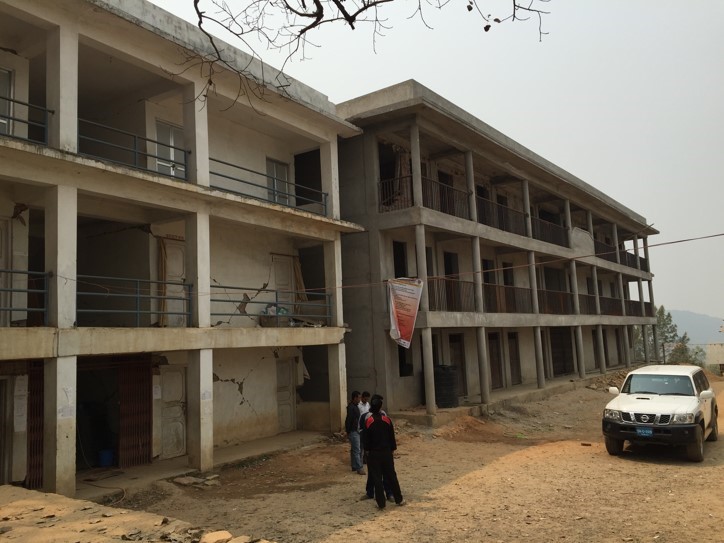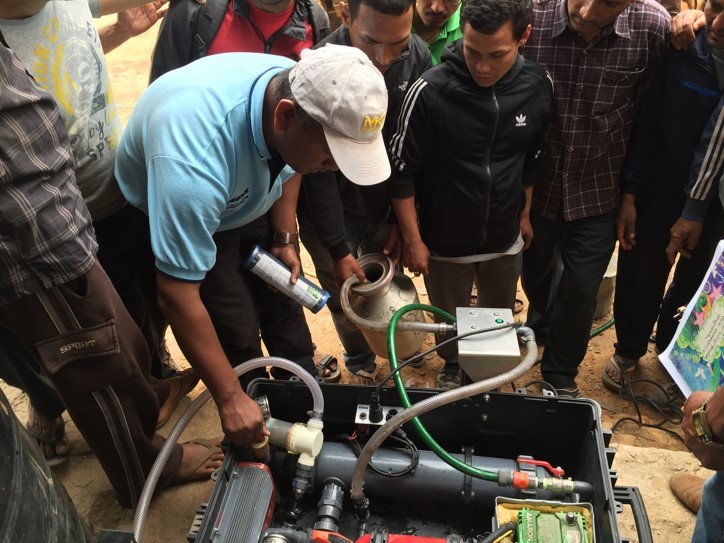
Nepal
The major earthquake in Nepal in April/May 2015 is already forgotten in Germany. But the people of Nepal will be busy rebuilding their country for some time to come. The earthquake and following aftershocks resulted in the deaths of around 8,000 people in Nepal. The Suderburg Campus of Ostfalia University of Applied Sciences is closely connected to Nepal as more than 25 Nepalese students have completed their Master’s degree there over the years. Suderburg graduate Kamal Khadka reported from his former home region of Sindhulpalchok, one of the hardest hit of the 14 regions affected in Nepal. 277,000 people live there in 66,600 homes – this is the equivalent of roughly three times the population of the District of Uelzen. 96% of the homes there were completely destroyed and 3,788 people were killed, 1.4% of the population. Practically everyone in Sindhulpalchok is now homeless. At the initiative of some Suderburg graduates, the “Suderburg supports Nepal” campaign was started immediately following the earthquake. Both faculties of the Suderburg campus (the faculty of Civil and Environmental Engineering and the faculty of Trade and Social Work) and the people of Suderburg got involved in the campaign in a variety of ways. Appeals for donations were made at the annual meeting of the Karl-Hillmer-Gesellschaft, the Hydraulic Engineering Conference of Erica engineers and the Rieselwiese Festival. Local businesses in Suderburg also contributed with donations of money and supplies. For the Rieselwiese Festival, which was organized by the Suderburg community and the Erica Fraternity, students and university employees baked and sold cakes to raise money for Nepal. All proceeds were donated to the “ Suderburg supports Nepal” campaign. At family parties, donations were collected instead of gifts. In total, the fundraisers were able to collect € 5,088.33, and thus the goal of financing a complete drinking water treatment system for Nepal was achieved.
 Guneshwar Mahato (light blue T-shirt) provides water to people in the village of Sanosirubari
and to children from the Sidhi Ganesh Higher Secondary School in Sindhupalchowk District, Nepal.
The fresh water was supplied by Trunz Water’s Survivor 300 water treatment system. The machine was
paid for by donations from Suderburg.
Guneshwar Mahato (light blue T-shirt) provides water to people in the village of Sanosirubari
and to children from the Sidhi Ganesh Higher Secondary School in Sindhupalchowk District, Nepal.
The fresh water was supplied by Trunz Water’s Survivor 300 water treatment system. The machine was
paid for by donations from Suderburg.
The water treatment system delivers 180 litres of water per hour and runs on solar power, so it doesn’t require any additional infrastructure. It was purchased shortly thereafter. Suderburg graduate Guneshwar Mahato picked the system up in Switzerland and brought it to Nepal in early November 2015. In doing so, additional costs and time delays could be avoided. However, it still took some time before the system could be used because there wasn’t enough gasoline to transport it further into the country due to disputes between Nepal and India.
The system eventually arrived in the village of Sanosirubari, where it supplies the residents there as well as the children who attend Sidhi Ganesh Higher Secondary School. The Sindhupalchowk District is one of the regions in Nepal that was most severely affected by the earthquakes on 25 April and 12 May 2015. 300 homes were completely destroyed here and water supply and disposal systems were heavily damaged. Many families continue to live in tents and temporary shelters.
After installation of the Survivor 300 water treatment system that was provided by Suderburg, 125 residents in 25 homes and 450 school children had access to clean drinking water. Each family receives 40 litres per day, and each school child 2.5 litres. Ultrafiltration ensures that the water has a high standard of hygiene. Guneshwar Mahato set up the system and showed the residents how to use it, so that the system is guaranteed to work faultlessly for the long term.
Prof. Dr.-Ing. Klaus Röttcher, who supported the students and coordinated the campaign, is very satisfied with the result: “At the beginning of the campaign, I did not think it would be possible to pay for a complete system. But then a lot of people worked together and that is how it eventually worked out. The cooperation of the university and the Suderburg residents, as well as the numerous alumni who feel as strongly as ever connected to the university in Suderburg, was particularly successful. Thank you to all who contributed to this a great experience.”
Please contact Prof. Dr.-Ing. Klaus Röttcher for more information.